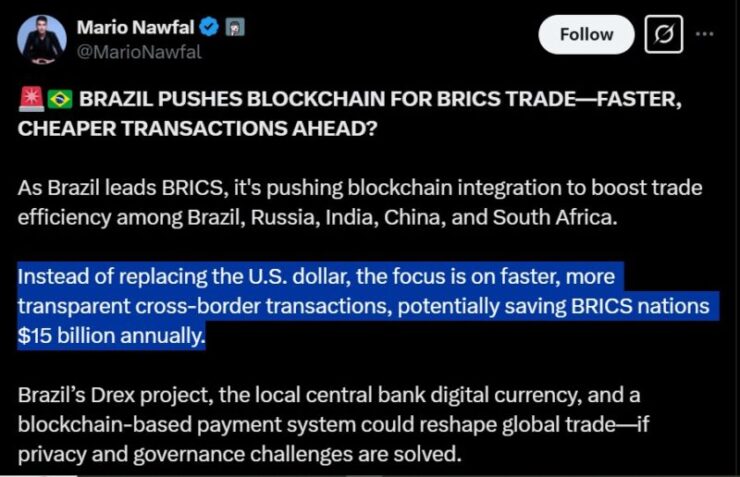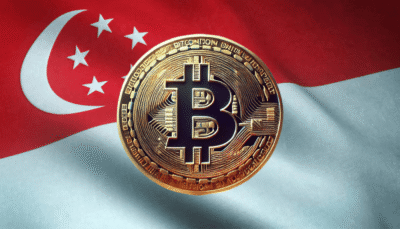As Brazil prepares to take over the rotating BRICS presidency in January 2025, the country is setting blockchain integration in cross-border trade as a key priority. According to Brazilian media outlet O Globo, the government aims to simplify international financial transactions for import and export contracts among BRICS nations by leveraging blockchain-based systems..
Previous discussions within BRICS largely revolved around creating a unified currency to facilitate trade between member nations—Brazil, Russia, India, China, and South Africa. However, Brazil’s approach now focuses on blockchain-powered payment systems that can speed up transaction settlements, lower costs, and improve security, all without the complexity of launching a shared currency.
Brazil’s Drex Project Aims to Bring Blockchain to BRICS Trade
As part of its push to integrate blockchain into BRICS trade, Brazil is advancing Drex, a Central Bank-led pilot project designed to create a tokenized financial infrastructure for buying and selling assets. One of Drex’s key areas of focus is cross-border transactions, which could potentially redefine financial settlements among BRICS nations by introducing faster, more transparent, and secure payment systems.
The project is being closely studied as a model for international trade transactions, particularly in the context of reducing reliance on traditional financial intermediaries. By leveraging blockchain’s ability to provide traceable, tamper-proof records, Brazil hopes Drex will streamline trade settlements while ensuring compliance with regulatory frameworks.
Despite its potential, the initiative faces technical and regulatory challenges, particularly in balancing decentralization with oversight and ensuring seamless integration with existing financial systems. However, as Brazil assumes its BRICS presidency in 2025, Drex could emerge as a cornerstone initiative, setting the stage for broader blockchain adoption within global trade networks.
Geopolitical Momentum: BRICS Moves Away from the U.S. Dollar
This strategic shift comes amid a broader BRICS effort to reduce reliance on Western financial systems, particularly the U.S. dollar. Russian President Vladimir Putin, speaking at the BRICS Business Forum in October 2024, underscored the importance of digital currencies in strengthening economic independence for emerging economies. Putin revealed that BRICS had developed an alternative financial messaging system comparable to SWIFT and had begun testing national digital currencies for large-scale economic projects.
A collaborative study by the Russian Ministry of Finance, the Bank of Russia, and the law firm Yukov & Partners examined the potential of blockchain-powered digital currencies in reshaping BRICS trade. Findings suggested that transitioning a significant portion of cross-border settlements to blockchain networks could save BRICS nations billions annually while increasing financial autonomy.
Blockchain’s Role in BRICS’ Trade Evolution
Brazil has previously explored blockchain-powered payment solutions. In 2023, Visa partnered with Agrotoken, Microsoft, and Sinqia to test a Universal Payment Channel (UPC) for tokenized transactions, particularly targeting Brazil’s agricultural sector. This pilot demonstrated blockchain’s potential to reduce trade inefficiencies, particularly for small businesses and rural economies.
The broader application of blockchain in BRICS trade could eliminate intermediaries, provide immutable transaction records, and push regulators to modernize digital finance policies. The ability to offer real-time auditing and compliance tracking could reshape global trade by fostering greater transparency and adaptability in economic transactions between emerging economies.

Quick Facts:
- Brazil leads BRICS in exploring blockchain technology to enhance cross-border trade efficiency.
- The focus has shifted from creating a unified currency to integrating blockchain for improved transaction processes.
- Brazil’s Central Bank is piloting ‘Drex’, a project aimed at supporting tokenized cross-border transactions.
- Challenges include balancing privacy concerns with regulatory requirements in implementing blockchain-based payment systems.





